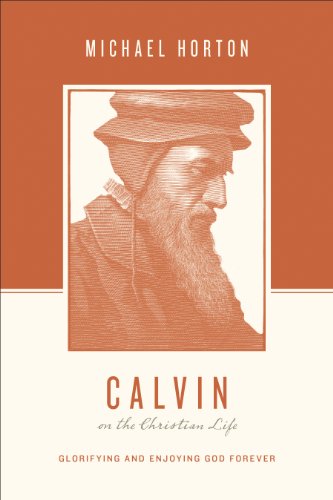Review: Michael Horton’s Calvin on the Christian Life
Jean Calvin. Perhaps instead: John Calvin. The man behind the soteriology that bears his name. Author of commentaries on a majority of the Bible. Author of one of the most important systematic theologies in Christian history, The Institutes of the Christian Religion. Despite the impact he has had his history has been lost amidst theological debates that often occur over coffee and beer.
If it sounds like this review is a little more personal than my normal work that’s because it is. John Calvin is a hero to me. Reading his Institutes brought to life for me the full wealth of Christian theology. I can say with no deceit that I would not be where I am right now except for the life changing thought of this man. Because of this, it has pained me to his theology boiled down to TULIP. To my enjoyment, Michael Horton in Calvin on the Christian Life provides the opposite. He has written a valuable introduction to the fuller life and theology of John Calvin. Though Calvin has its moments of deep theology (e.g., chapters 6 & 7), Horton has written for the masses. Laymen, armchair theologians, and pastors will be well served by the common language, familiar tone, and quality of Horton’s writing.
Starting with valuable historical background (chapters 1 & 2) Horton presents the theologian, pastor, and man as he existed in his own time and place. Self-described as shy and timid, Calvin’s theology has been ripped out of this context and become part of the hippest theology in the church. This process has occurred by losing Calvin’s thoughtful insights on knowledge (chapter 3), the sacraments (chapter 7), and the importance of Christian vocation (chapter 13). The valuable quotes and summarization in these chapters are too many to count. The brilliance of Calvin stands out and makes one wonder how these insights have been lost in inordinate favor of Calvin’s views on sovereignty and predestination.
Ever the staunch adherer to church history/theology, as it adhered to Scripture, Horton demonstrates multiple times how much of Calvin’s theology was synthesis (reformational) and not a creation of his genius (revolutionary). John Calvin was a man of the Scriptures. He was a man within the Church’s tradition. He was a man of the people of Geneva and the refuges that sought comfort there. All of these elements have bearing on his theology for the church and missions within the Christian life.
In writing Calvin on the Christian Life, Michael Horton has done the Reformed church an incredible service. Though I disagree sharply with portions of Horton’s analysis on Calvin’s view of God’s law (chapter 10 & 11), I cannot recommend this volume highly enough for individuals desiring to set aside cardboard “Calvinism” and give a fellow brother in Christ, namely John Calvin, the time of day to express his thoughts in context and practicality.
Disclosure of Material Connection: I received this book free from the publisher. I was not required to write a positive review. The opinions I have expressed are my own. I am disclosing this in accordance with the Federal Trade Commission’s 16 CFR, Part 255: “Guides Concerning the Use of Endorsements and Testimonials in Advertising.”

Joshua Torrey is a New Mexico boy in an Austin, TX world. He is husband to Alaina and father to Kenzie & Judah and spends his free time studying for the edification of his household. These studies include the intricacies of hockey, football, curling, beer, and theology. You can follow him @AustinPreterism and read his theological musings and running commentary of the Scriptures at The Torrey Gazette.
